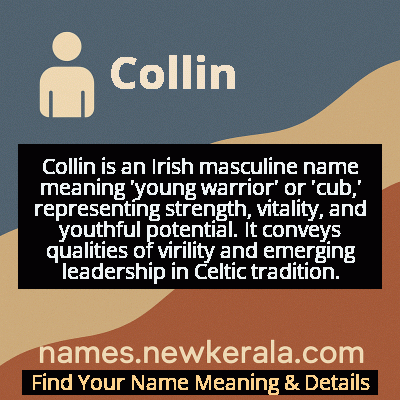Collin Name Meaning & Details
Origin, Popularity, Numerology Analysis & Name Meaning of Collin
Discover the origin, meaning, and cultural significance of the name COLLIN. Delve into its historical roots and explore the lasting impact it has had on communities and traditions.
Name
Collin
Gender
Male
Origin
Irish
Lucky Number
2
Meaning of the Name - Collin
Collin is an Irish masculine name meaning 'young warrior' or 'cub,' representing strength, vitality, and youthful potential. It conveys qualities of virility and emerging leadership in Celtic tradition.
Collin - Complete Numerology Analysis
Your Numerology Number
Based on Pythagorean Numerology System
Ruling Planet
Moon
Positive Nature
Diplomatic, friendly, artistic, empathetic.
Negative Traits
Over-sensitive, moody, indecisive, prone to self-pity.
Lucky Colours
Green, cream, white.
Lucky Days
Monday.
Lucky Stones
Pearl, moonstone.
Harmony Numbers
1, 3, 4.
Best Suited Professions
Diplomats, mediators, caregivers, artists.
What People Like About You
Cooperative spirit, friendliness, artistic talent.
Famous People Named Collin
Collin Raye
Country Music Singer
Multiple Grammy-nominated country artist with 16 number-one hits
Collin Morikawa
Professional Golfer
Two-time major championship winner and Olympic medalist
Collin Sexton
Professional Basketball Player
NBA player known for his scoring ability and athleticism
Collin McHugh
Professional Baseball Player
MLB pitcher and World Series champion
Name Variations & International Equivalents
Click on blue names to explore their detailed meanings. Gray names with will be available soon.
Cultural & Historical Significance
The double 'l' spelling became popular in the 20th century as a distinctive variation of the more common 'Colin,' particularly in North America where Irish and Scottish immigrants sought to preserve their cultural heritage while adapting to new environments. Throughout history, the name has been associated with strength, loyalty, and leadership qualities, reflecting the warrior traditions of Celtic cultures. The name's evolution from its Gaelic origins to modern usage demonstrates how cultural names can maintain their essential meaning while adapting to different linguistic contexts and time periods.
Extended Personality Analysis
Individuals named Collin are often perceived as strong, reliable, and charismatic leaders with a natural athletic ability and competitive spirit. They tend to possess a blend of traditional values and modern adaptability, making them well-respected in both personal and professional circles. Collins are typically known for their determination and perseverance, approaching challenges with a focused mindset and rarely backing down from difficult situations. Their 'virile' nature often manifests in physical confidence and a commanding presence that naturally draws attention and respect.
Beyond physical strength, Collins frequently exhibit emotional resilience and mental fortitude. They are often described as loyal friends and protective family members who take their responsibilities seriously. Many Collins display excellent problem-solving skills and practical intelligence, combined with a warm, approachable demeanor that makes them effective communicators and team players. Their competitive nature drives them to excel in various fields, particularly sports, business, and leadership roles where their combination of strength, intelligence, and charisma can shine. Despite their strong exterior, many Collins possess a thoughtful, reflective side that balances their assertive qualities.
Modern Usage & Popularity
In contemporary times, Collin maintains steady popularity as a strong, classic name with Irish roots. It consistently ranks within the top 200-300 names for boys in English-speaking countries, particularly in the United States, Canada, and Australia. The name has seen a resurgence in recent years as parents seek traditional yet distinctive names with cultural heritage. Modern Collins are often associated with athleticism and success, influenced by prominent athletes and entertainers bearing the name. The double 'l' spelling provides a slightly more unique alternative to 'Colin' while maintaining the same pronunciation and heritage. The name appeals to parents who value both strength and approachability in a name, and it pairs well with both traditional and modern middle names. Current usage trends show Collin being particularly popular among families with Irish or Scottish ancestry who want to honor their heritage without choosing an overtly ethnic name.
Symbolic & Spiritual Meanings
Symbolically, Collin represents youthful strength, potential, and the journey from promise to fulfillment. The original meaning of 'young pup' or 'cub' evokes images of growth, development, and the raw potential that will mature into powerful capability. This name carries connotations of loyalty, protection, and family ties, much like the wolf packs from which the original meaning derives. Collin symbolizes the bridge between tradition and modernity, honoring Celtic heritage while adapting to contemporary contexts. The name also embodies resilience and transformation, as seen in literary characters who overcome physical or emotional challenges to emerge stronger. In a broader sense, Collin represents the archetype of the reliable protector who combines physical strength with emotional intelligence and leadership qualities, making it a name that suggests both immediate capability and future greatness.

